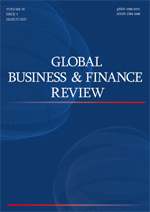The Rural-Urban Inequality in Fringe Benefits for Workers in SMEs: Evidence from Vietnam
- People & Global Business Association
- Global Business and Finance Review
- Vol.30 No.9
-
2025.09198 - 210 (13 pages)
-
DOI : 10.17549/gbfr.2025.30.9.198
- 37

Purpose: Rural-urban inequality in non-wage benefits remains a central focus for policymakers; however, there is little empirical evidence reported for developing economies, such as Vietnam. This study investigates the rural-urban disparity in mandatory fringe benefits in Vietnam. Design/methodology/approach: This study applies a logistic regression model and utilizes a firm-level panel dataset of small and medium enterprises (SMEs) in Vietnam (2005-2015). Findings: Our findings are threefold. First, the probability of rural SMEs providing five types of statutory fringe benefits—social insurance, health insurance, compensation, sick leave, and maternity leave—to workers is significantly lower than that of their urban counterparts. Second, the disparity in the probability of sick leave payments between rural and urban SME workers is the largest, while the gap in social insurance shows the smallest difference. Last, access to formal loans, the presence of labor unions, and larger firm size are identified as contributing factors to the provision of mandatory fringe benefits. Research limitations/implications: These results may provide insights for place-based policymakers in designing regional development strategies and legal assistance initiatives to improve welfare for rural workers in developing countries. Originality/value: For the first time, robust empirical results of the rural-urban disparity in social insurance, health insurance, and maternity leave paid to workers in SMEs are presented for a developing country, such as Vietnam.
I. Introduction
II. Background for Fringe Benefits in Vietnam
III. Data and Methodology
IV. Empirical Results
V. Conclusion
Funding Acknowledgement Statement
Conflicts of Interest
References
(0)
(0)